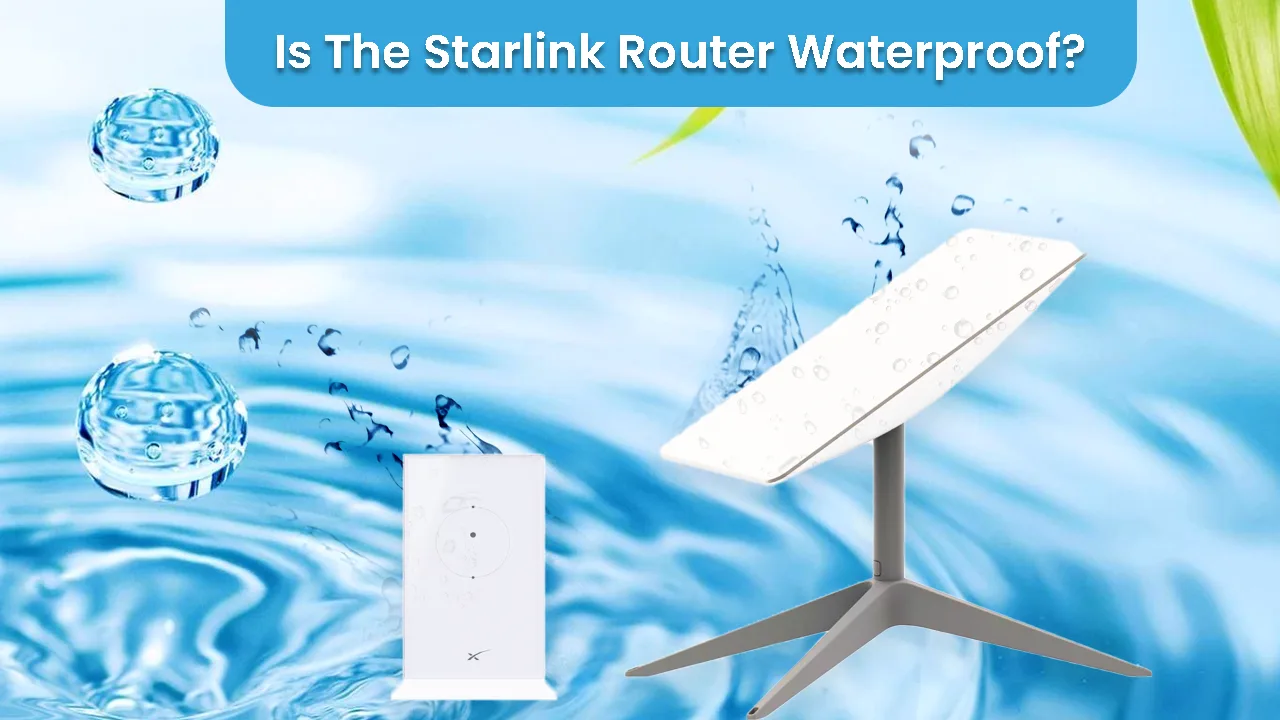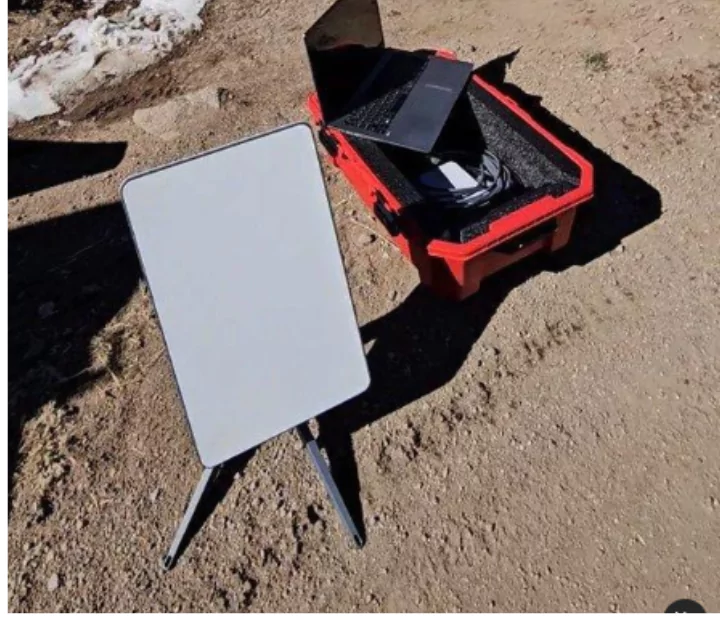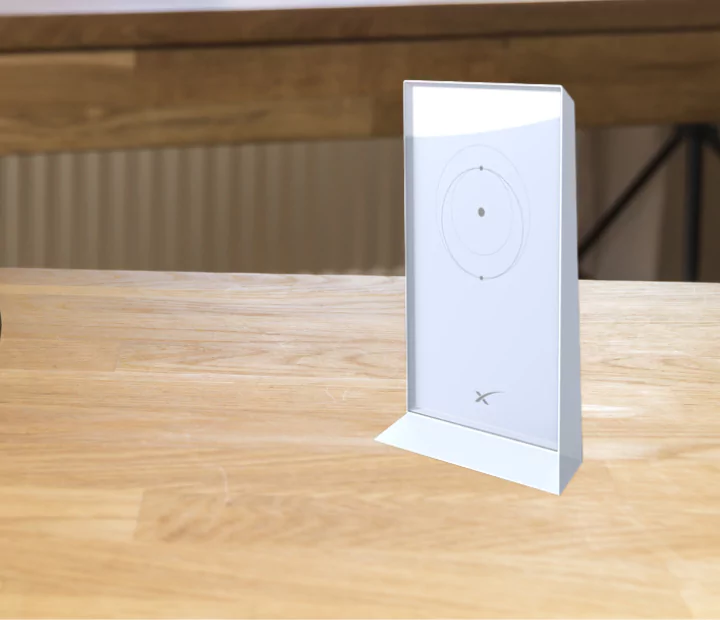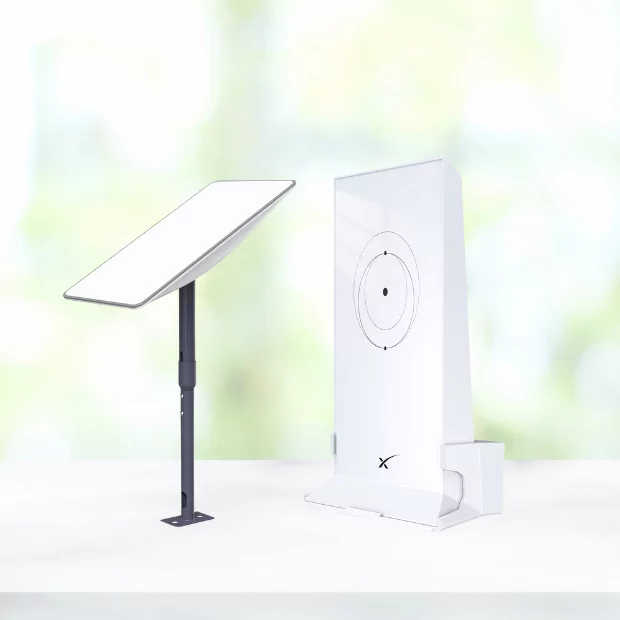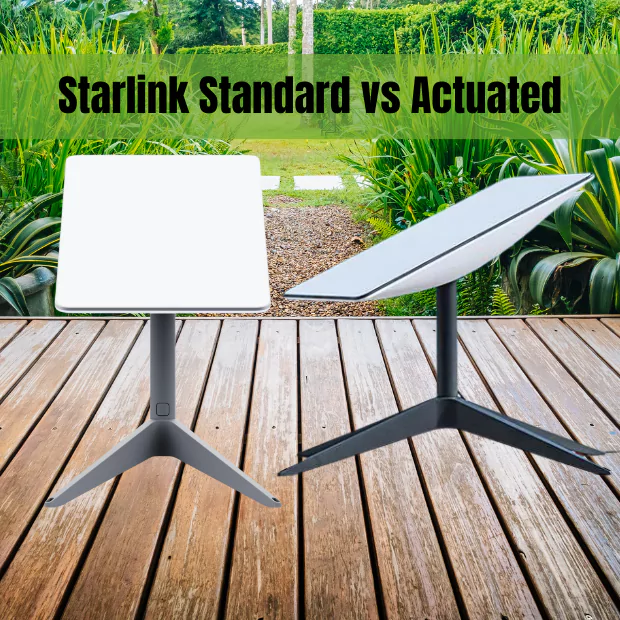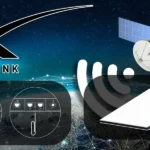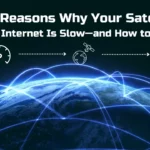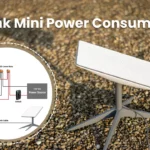The world is moving so fast, and the technologies are even faster. To grab the speed, you need a high-speed internet connection.
Satellite internet connectivity is the Usain Bolt of the internet world, and it’s engaging more and more users these days.
In the USA, Starlink and Hughesnet are two of the biggest satellite internet providers. Both ISPs have some unique features, advantages, and disadvantages. The best among these two ISPs depends on how they provide speed, service, and network coverage, as well as their price points.
Stay tuned to learn more and find out which ISP is the best, Starlink or Hughesnet.
| Hughesnet | Starlink | |
| Best for | Reliable interconnection | High-speed rural internet connection with super portability |
| Types of Satellite | Geosynchronous orbit (GEO) satellites | Low Earth orbit (LEO) satellites |
| Download Speed | 50-100Mbps | 20 – 250Mbps |
| Availability | Less coverage | More coverage |
| Latency | Higher | Lower |
| Data Capacity | 100-200 GB | Unlimited, 1-5 TB |
| Installation Method | Free installation by a professional | Self-installation |
| Distance from Satellite | Around 22,000 miles. | Around 342 miles |
| Price | $50-$110 based on the plans | $90-$500 based on the plans |
| Equipment Fee | $450 | $599 |
What is Satellite Internet?
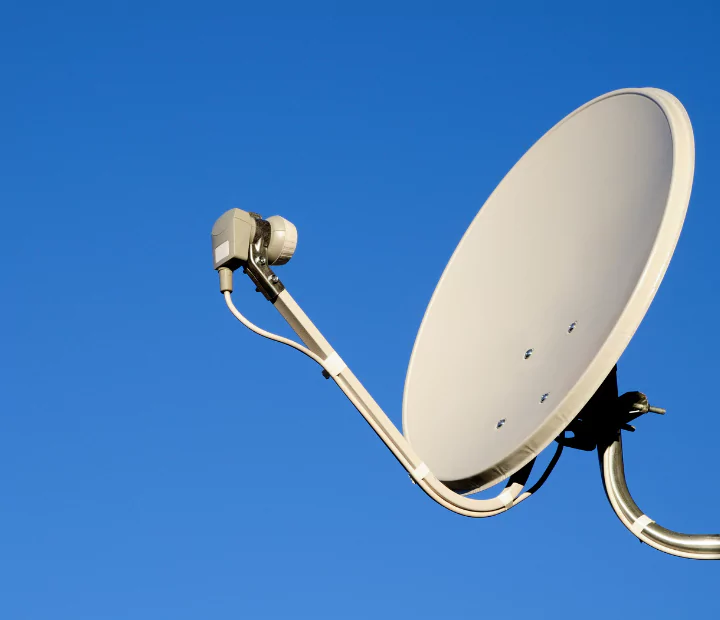
In 1996, Hughesnet Network System, or HNS-1, introduced the concept of satellite internet. It’s a new and faster option than the regular internet distribution system.
In a satellite internet connection, you will get the connection from an orbiting satellite. Your home or business will need a ground device or hardware to receive the signal from the orbiting satellite.
Satellite internet is a great innovation, and it’s very useful for remote areas and moving vehicles and vessels. It’s obvious not to have a wired internet connection on moving objects.
There are some places, like mountains or deep forests, where you may not find the cellular network. Satellite internet can be very useful and even a lifesaver in those areas.
Generally, there are two types of satellite internet connections: one for personal use and the other for business purposes. Personal connections are low in cost, while business connections are expensive but have a higher speed than personal connections.
Starlink package comparison:
Hughesnet vs. Starlink: Who provides more speed?
The download speed has always been a concern for internet users. Now, compared to Hughesnet, you are supposed to have a download speed from Starlink. However, based on the plans, the range of speed can vary. Starlink claims to deliver download speeds from 20 – 250Mbps. On the other hand, the range is 50-100 Mbps for Hughesnet.
But we would like to know from the Ookla Speedtest report on North American satellite internet providers. The report shows that Starlink generates a download speed of 53 Mbps. But the scenario is quite worse in the case of Hughesnet. The satellite internet service provider delivers a 20.86 download speed.
Then again, even if users can have better than 20.86 Mbps, the download speed of Starlink will always be higher due to the usage of Low Earth Orbit (LEO) satellites. Faster connectivity should be one of your preferences, right?
Honest Comparison: Starlink and Hughesnet
Both Starlink and Hughesnet offer different internet plans with different features and prices. Let’s see the features below:
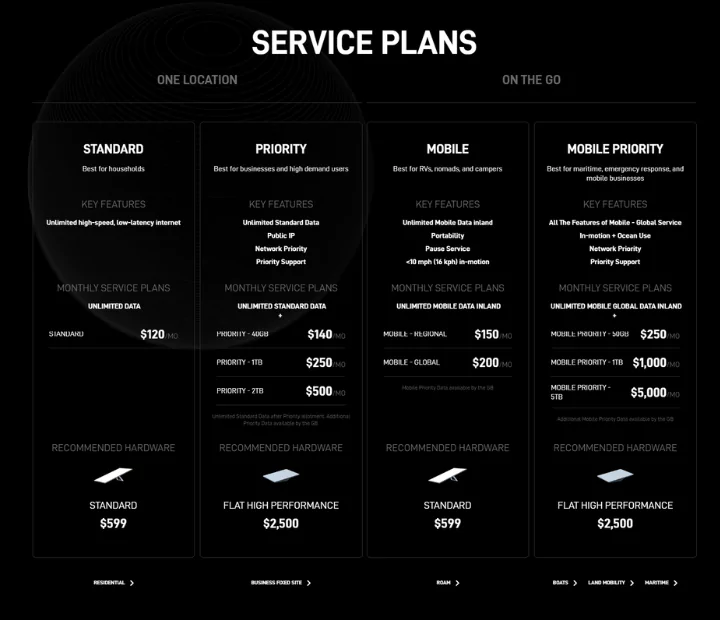
Starlink Internet Plans:
| Plan | Features | Price |
| Starlink Residential/Standard | Data usage is standard and unlimited. Speed: 20-220Mbps | Per month, $120. For hardware, $599 or $2500 |
| Starlink Priority | This plan is usable even while you are moving. Multiple priority data plans are available. | $140 – $500 for every month. Additional $599 or $2500 for setup hardware. |
| Starlink RV or Starlink Mobile | This plan is for campers or RV owners to provide connectivity in remote areas where mobile internet or signal is limited. | Data usage is unlimited and standard with several multiple-data plans. Speed: 20-220Mbps |
| Starlink Mobile Priority | This plan is usable even while you are moving.Multiple priority data plans are available. | $250 – $5000 for every month.Additional $2500 for hardware. |
Well, the price of Starlink data plans depends on the location and the available speed in that particular area. The cost of a similar package can be a little higher in high-capacity areas.
Hughesnet: Internet Plans
| Plan | Features | Price |
| Hughesnet Select | Unlimited data. Excellent for basic and casual browsing and personal use.Speed: 50Mbps | $49.99 for every month. |
| Hughesnet Elite | Unlimited data usage.Preferred for social media browsing, streaming, and music.Speed: 100Mbps | $64.99 for every month. |
| Hughesnet Fusion | Unlimited data usage.Good for gaming and video streaming.Both wireless and satellite technologies are combined in this plan.Speed: 100Mbps | $79.99 per month. |
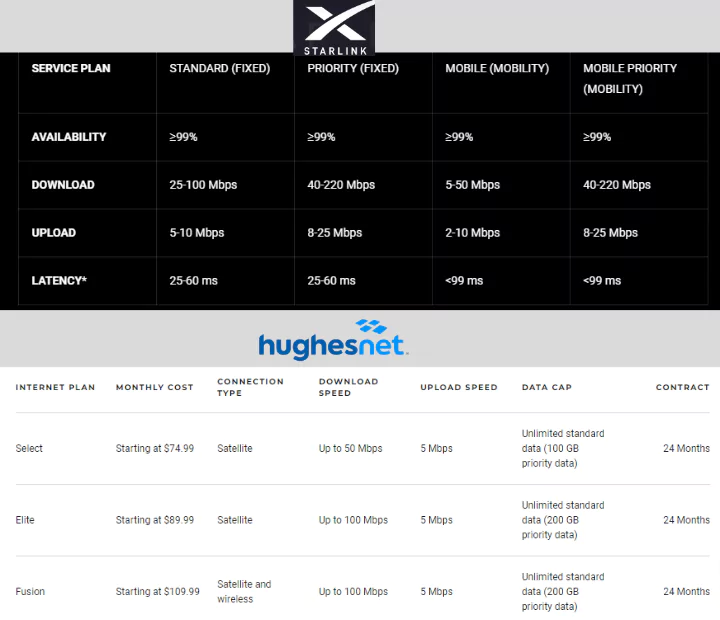
Latest ISP:
Speed Comparison
Everyone loves to browse faster and download movies even faster.
Can Hughesnest fulfill this minimum requirement?
If you are a Hughesnet user, you may get almost 50–100 Mbps of download speed. But the speed may vary depending on the peak and off-peak hours of the day.
On the other hand, Starlink seems to have a higher download speed than Hughesnet. You can enjoy Starlink at a speed of almost 20-100 Mbps. but the speed is highly dependent on your location, time, and the capacity of that individual satellite.
Do you know why Starlink can provide faster internet speeds? The reason is, their satellites are closer to the ground. Most of the satellite internet providers use GEO satellites, but Starlink uses LEO satellites.
The distance of GEO satellites is 23k miles from the surface, but LEO satellites are only 1242 miles above the earth’s surface.

Data Comparison
Starlink and Hughesnet are similar in one point; both of them don’t have any limitations on data usage. So, there are no identical data caps.
Starlink offers 1TB of high-speed data, which is way more than other satellite ISPs. The amount is 5 times larger than Hughesnet provides per month (200GB).
That means, Starlink can provide a large amount of faster data, and Hughesnet can provide relatively low-speed standard data throughout the month.
Installation
If you choose the Standard package from Starlink, you have to pay $599 for the ground hardware and for the setup. But you have to pay $2500 for premium package ground hardware.
If you go with Hughesnet, the company may allow you to pay the hardware cost in monthly installments. The monthly installment can be around $14.99 – $19.99 per month. You can also pay $449.98, and buy the hardware device at once.
New ISP With Offer:
Availability
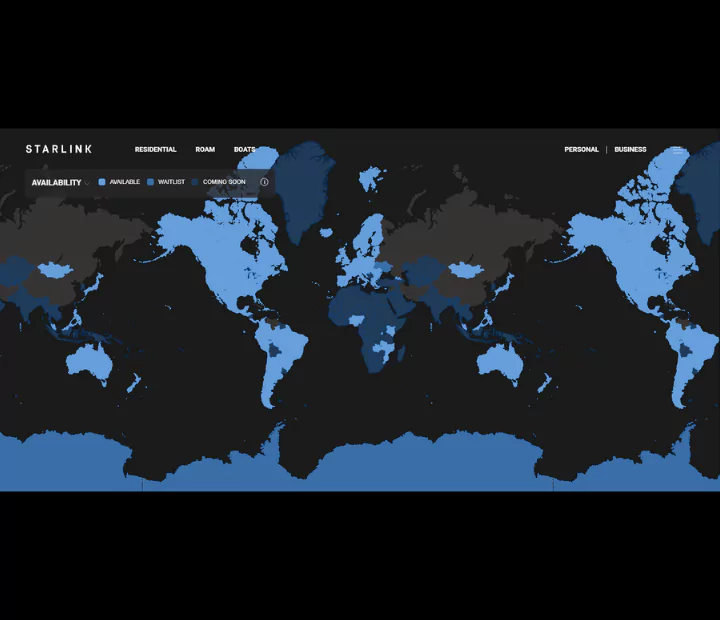
Starlink is available in most of the states in the USA. The rural areas of these states are under the coverage of this ISP. You can see its covered areas on the Starlink availability map.
But there are some areas in Texas, Louisiana, Arkansas, Missouri, and Mississippi that are outside of the Starlink coverage facility.
On the other hand, Hughesnet is available in the surrounding areas of the USA, Puerto Rico, and Alaska. However, both ISPs are working to increase their coverage.
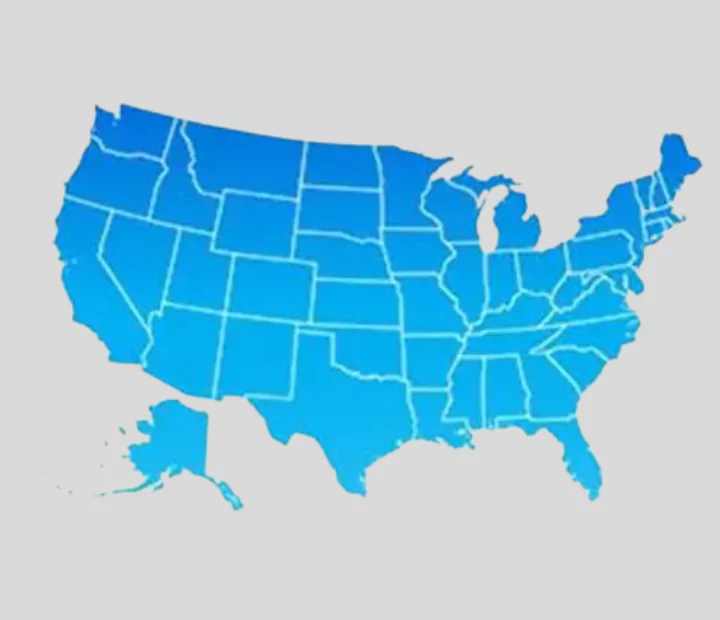
Cancellation Policy
Starlink has a nice cancellation policy. After one week of taking the Starlink connection, if you decide to cancel the connection, Starlink will not charge you anything for the cancellation. You will get a similar policy for Hughesnet satellite internet as well. So, both ISPs don’t have any early termination fees.
Data Cap Comparison
In the beginning, Starlink had a data cap policy, but they moved away from that policy. Now, they have an unlimited data plan for all their packs. Similarly, Hughesnet also doesn’t have any data caps. But the data burning rate of Hughesnet can be a little slower.
Hughesnet offers extra data usage of around 50GB during a certain period of the day. You can keep your heavy data transfer works, like system updates for that specific time.
Starlink Packages:
Which Satellite Internet Connection Should You Get?
If you can spend the $599 for setting up the Starlink hardware, check the availability of satellite internet in your area in the Starlink availability map, and get the connection. It’s first and unlimited as well.
The additional $599 for the Starlink hardware is not so expensive compared to its service and benefits. Additionally, you can pay this amount in installments.
Don’t feel bad if you don’t have Starlink coverage in your area, Hughesnet is also pretty good, and it’s affordable as well. Let me tell you some great news about Hughesnet; Recently, it launched multipath technology, which will ensure high-speed internet consistently.
Who Offers the Best Deal?
Both internet service providers come with many plans for various needs. But compared to Hughesnet, Starlink’s plans are even more versatile. Now let’s have a quick look at the plans they offer with updated pricing;
Hughesnet Plans:
- Select: 75$ (100GB)
- Elite: $90 (200 GB)
- Fusion: $100. (200 GB)
Starlink Plans:
- Standard: $90-$120 (Unlimited Standard)
- Standard Priority: $140-$1,500 (1TB-5TB)
- Mobile: $150-$599 (Unlimited Mobile)
- Mobile PPriority: 250-$5,000 (1TB-5TB)
Now, compared to Starlink, the Hughesnet seems quite affordable. But when looking at the capacity, you can decide what you need! Besides, in order to go with the Hughesnet plans, you have to sign a two-year contract. In the case of Starlink, no contact is required.
Compare With FAQs And Short Answers
How fast is Starlink internet speed?
Between 25 and 220 Mbps.
Is Starlink fast enough for gaming?
Yes! The best internet package will be a great option for gaming.
What is the downside of Starlink?
Speeds are slower compared to fiber and FWA.
How fast is HughesNet internet speed?
Hughesnet’s plans typically offer 25Mbps download speeds, except for the Satellite-only 15 GB Data plan and the Fusion 200 GB plan, which offer speeds up to 50Mbps.
Is HughesNet fast enough for online gaming?
HughesNet Internet is ideal for those who prefer low-latency network connections for online multiplayer and high-speed internet games.
What is the downside of the Hughesnet internet?
HughesNet offers unlimited data usage without imposing overages, but its service speeds are significantly reduced due to the absence of a hard data cap.




